
spatz
An opinionated template for building full-stack Svelte applications ridiculously fast. Includes auth, database, admin panel, user dashboard, themes, icons, and more.
Stars: 74
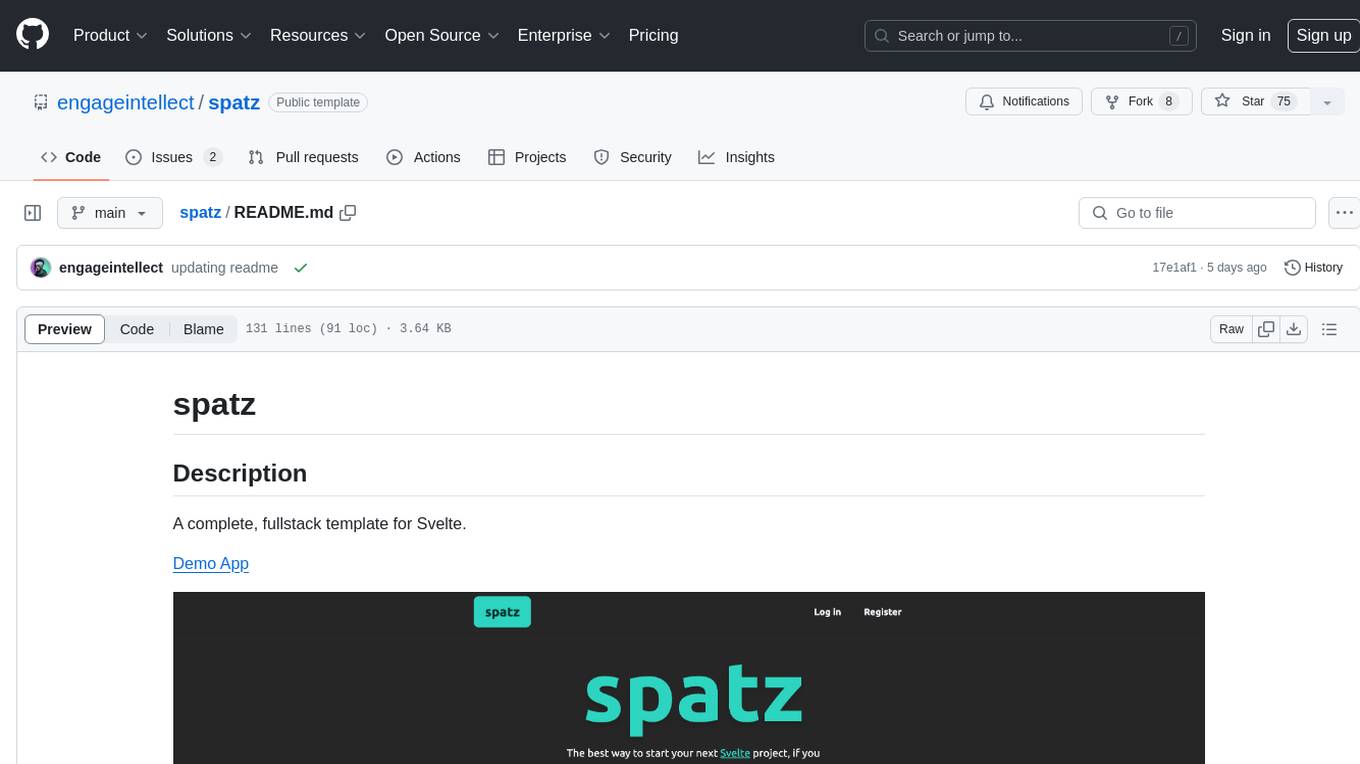
Spatz is a complete, fullstack template for Svelte that includes features such as Sveltekit for building fast web apps, Pocketbase for User Auth and Database, OpenAI for chatbots, Vercel AI SDK for AI/ML models, TailwindCSS for UI development, DaisyUI for components, and Zod for schema declaration and validation. The template provides a structured project setup with components, stores, routes, and APIs. It also offers theming and styling options with pre-loaded themes from DaisyUI. Contributions are welcomed through feature requests or pull requests.
README:
A complete, fullstack template for Svelte.
- Sveltekit: Futuristic web framework for building blazing fast web apps.
- Pocketbase: Self-contained User Auth, Database, Admin UI, and API documentation.
- OpenAI: chatGPT 3.5-turbo & 4.0-turbo for contextually aware chatbots.
- Vercel AI SDK: AI/ML models for image, text, and audio processing.
- TailwindCSS: A utility-first CSS framework for rapid UI development.
- DaisyUI: A tailwind-based component library.
- Zod: TypeScript-first schema declaration and validation.
- Create a directory for your Pocketbase instance and navigate to it.
mkdir pb-spatz
cd pb-spatz- Download the latest release of Pocketbase, unzip it, and start the server.
wget https://github.com/pocketbase/pocketbase/releases/download/v0.22.9/pocketbase_0.22.9_linux_amd64.zip
unzip pocketbase_0.22.9_linux_amd64.zip
./pocketbase serve --http="0.0.0.0:8090"-
Log in to the Pocketbase admin console at
http://localhost:8090/_/and create a new database. -
Go to settings > Import collections, then paste in the contens of
./pocketbase/pb_schema.json(from this repo) and click import.
- Clone the repo and navigate to the project directory.
git clone https://github.com/engageintellect/spatz
cd spatz- Copy .env.example and replace the values with your own.
cp .env.example .env.local (or .env)- Install the dependencies and start the development server.
pnpm i && pnpm run dev --host- Open your browser to
http://localhost:5173to see the app.
/src
├── /lib
├── /assets
│ └── /images
├── /components
├── /stores (global state)
├── /routes
│ ├── /guestbook
│ ├── /ai (nested routes)
│ │ ├── /a
│ │ ├── /b
│ │ └── /c
│ ├── /api
│ │ ├── /repoData (fetch github repository stars)
│ │ ├── /chat (OpenAI streaming API)
│ │__ /auth (Pocketbase auth)
│ │ ├── /login
│ │ ├── /register
│ │ ├── /logout
│ │ └── /reset-password
│ └── /my (user-specific routes)
│ ├── /account
│ ├── /profile
│ └── /settings
/pocketbase
├── pb_schema.json
/static
└── /docs (general documentation)
Icons are provided by iconify/svelte. You can search for icons on Icones.
The app comes pre-loaded with all of the standard themes from DaisyUI. You can also create your own here
Contributions are welcomed, and appreciated. If you have a feature request, please add it as an issue or make a pull request.
For Tasks:
Click tags to check more tools for each tasksFor Jobs:
Alternative AI tools for spatz
Similar Open Source Tools

spatz
Spatz is a complete, fullstack template for Svelte that includes features such as Sveltekit for building fast web apps, Pocketbase for User Auth and Database, OpenAI for chatbots, Vercel AI SDK for AI/ML models, TailwindCSS for UI development, DaisyUI for components, and Zod for schema declaration and validation. The template provides a structured project setup with components, stores, routes, and APIs. It also offers theming and styling options with pre-loaded themes from DaisyUI. Contributions are welcomed through feature requests or pull requests.
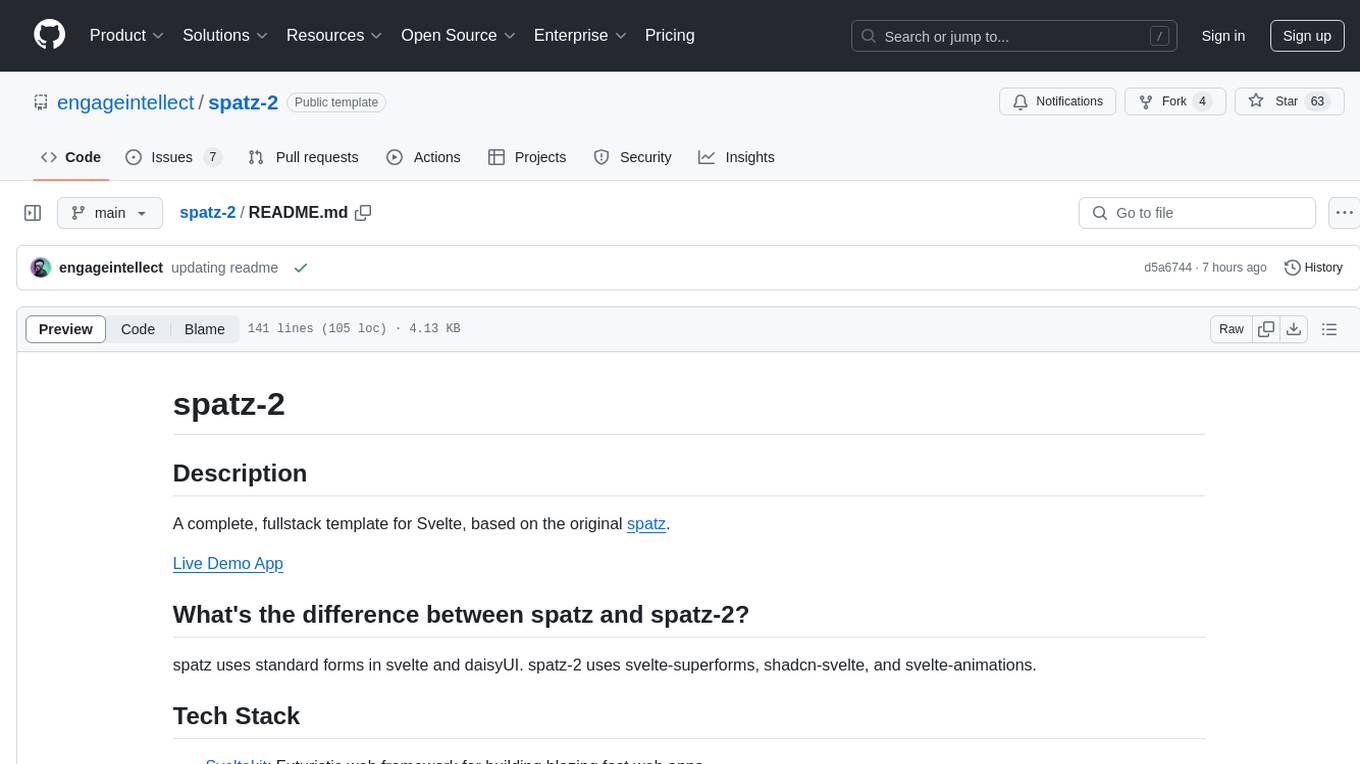
spatz-2
Spatz-2 is a complete, fullstack template for Svelte, utilizing technologies such as Sveltekit, Pocketbase, OpenAI, Vercel AI SDK, TailwindCSS, svelte-animations, and Zod. It offers features like user authentication, admin dashboard, dark/light mode themes, AI chatbot, guestbook, and forms with client/server validation. The project structure includes components, stores, routes, APIs, and icons. Spatz-2 aims to provide a futuristic web framework for building fast web apps with advanced functionalities and easy customization.
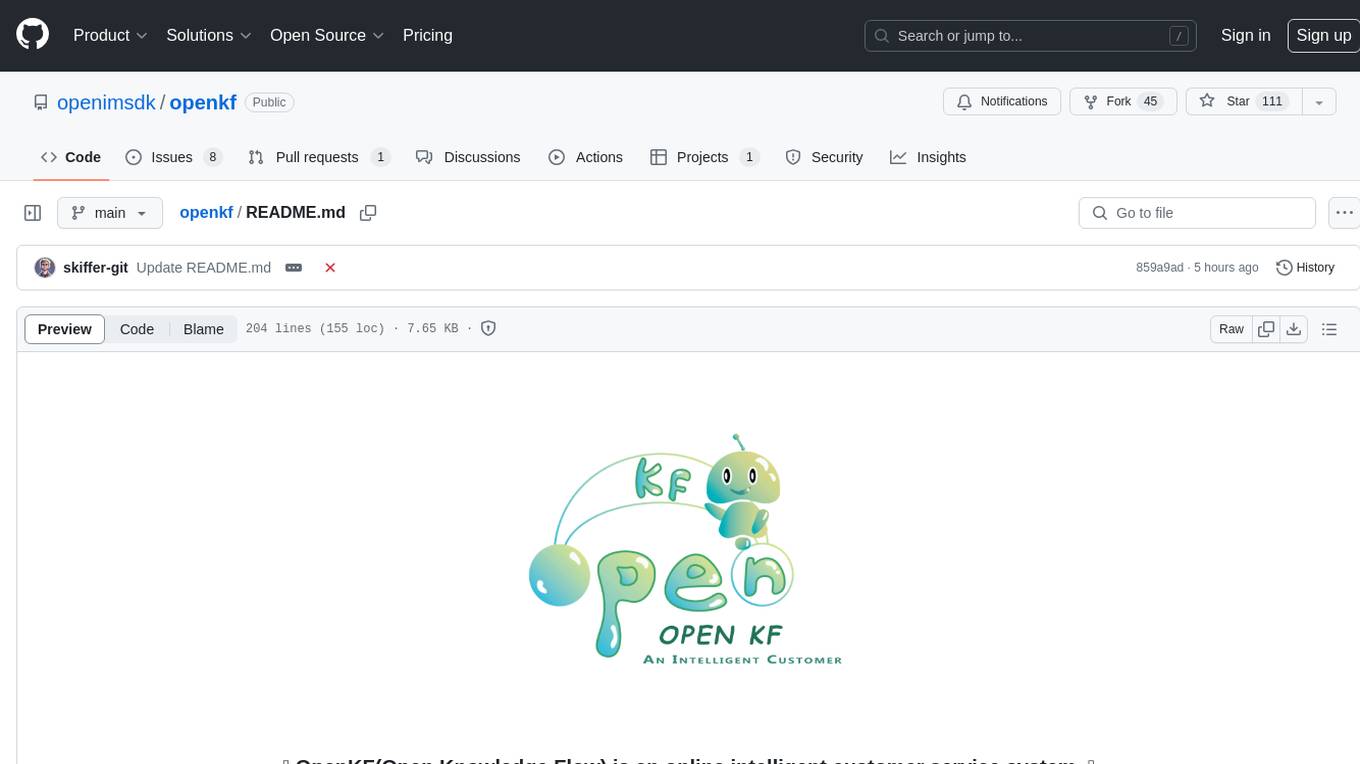
openkf
OpenKF (Open Knowledge Flow) is an online intelligent customer service system. It is an open-source customer service system based on OpenIM, supporting LLM (Local Knowledgebase) customer service and multi-channel customer service. It is easy to integrate with third-party systems, deploy, and perform secondary development. The system provides features like login page, config page, dashboard page, platform page, and session page. Users can quickly get started with OpenKF by following the installation and run instructions. The architecture follows MVC design with a standardized directory structure. The community encourages involvement through community meetings, contributions, and development. OpenKF is licensed under the Apache 2.0 license.
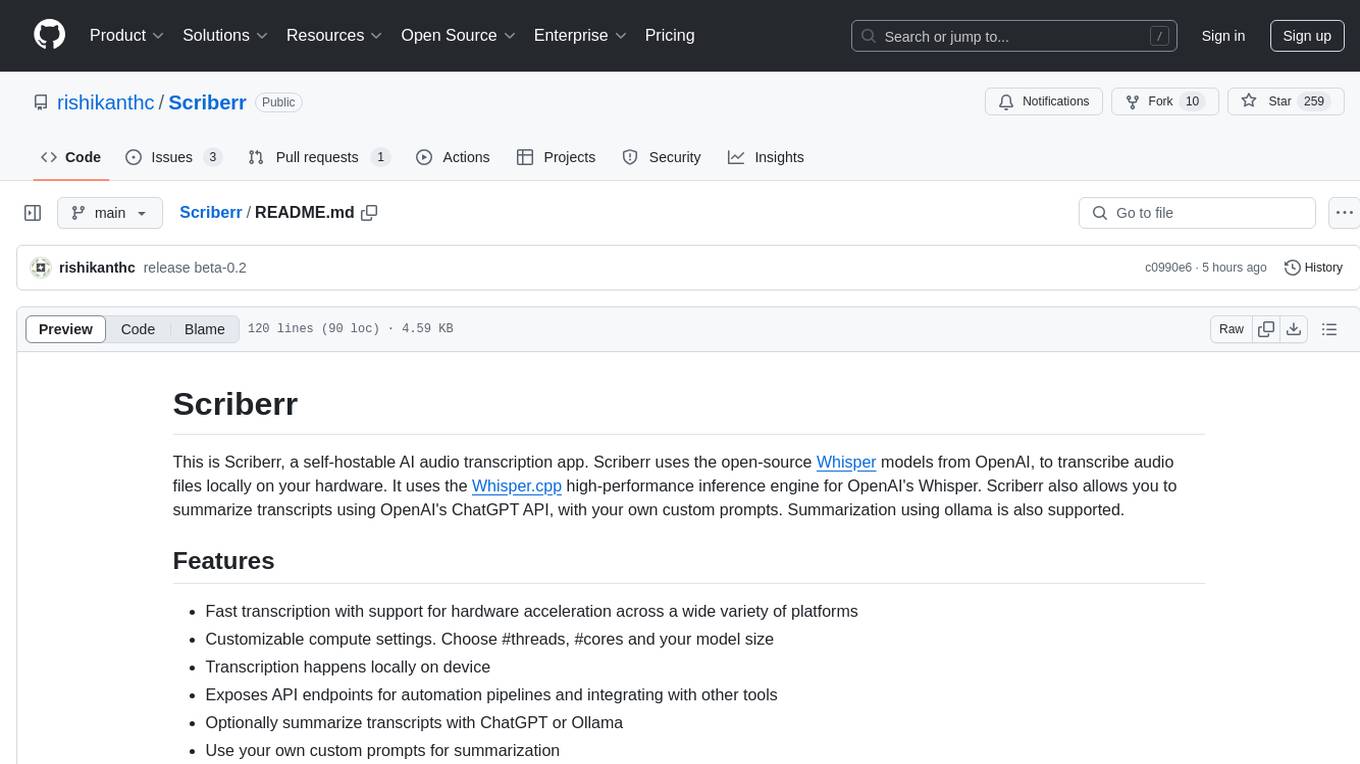
Scriberr
Scriberr is a self-hostable AI audio transcription app that utilizes open-source Whisper models from OpenAI for transcribing audio files locally on user's hardware. It offers fast transcription with customizable compute settings, local transcription on device, API endpoints for automation, and integration with other tools. Users can optionally summarize transcripts using ChatGPT or Ollama, with support for custom prompts. The app is mobile-ready, simple, and easy to use, with planned features including speaker diarization, audio recording, file actions, full text fuzzy search, tag-based organization, follow-along text with playback, edit summaries, export options, and support for other languages. Despite being in beta, Scriberr is functional and usable, albeit with some rough edges and minor bugs.
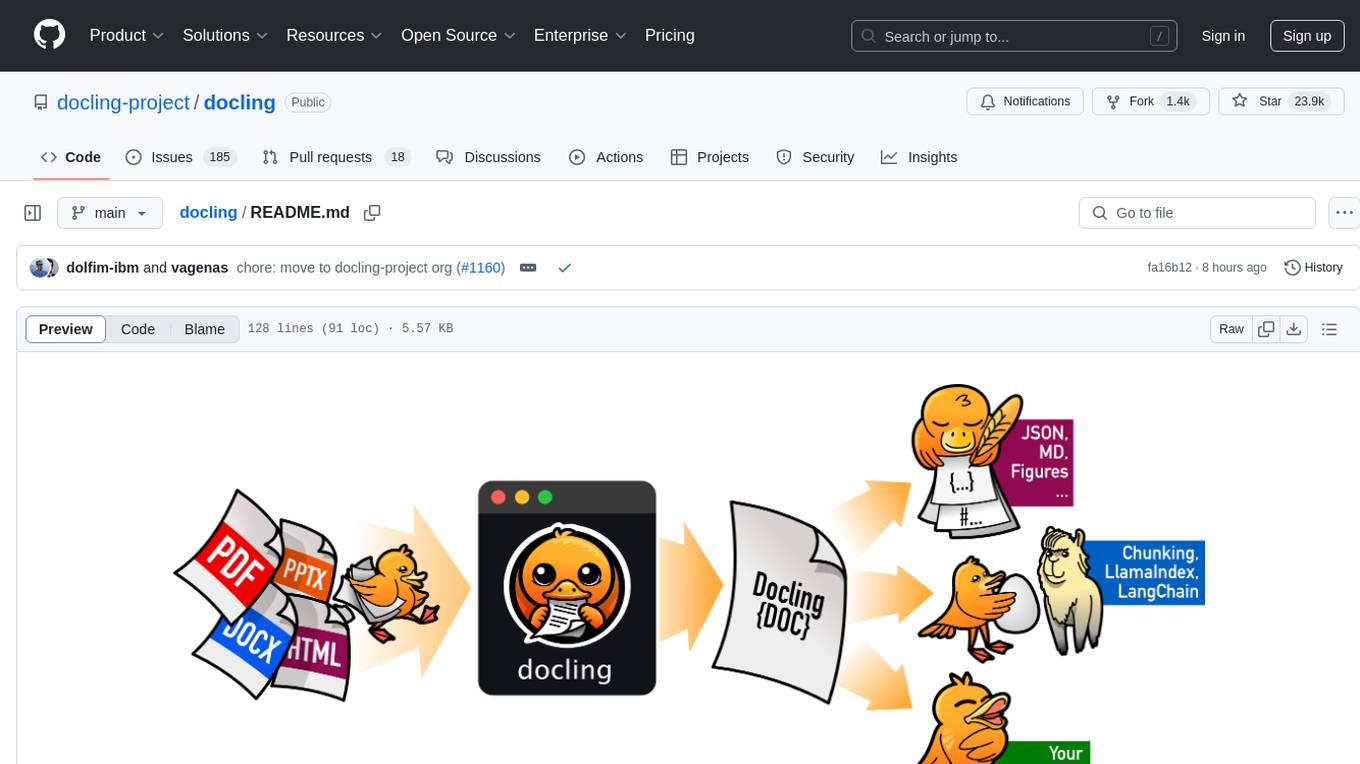
docling
Docling simplifies document processing, parsing diverse formats including advanced PDF understanding, and providing seamless integrations with the general AI ecosystem. It offers features such as parsing multiple document formats, advanced PDF understanding, unified DoclingDocument representation format, various export formats, local execution capabilities, plug-and-play integrations with agentic AI tools, extensive OCR support, and a simple CLI. Coming soon features include metadata extraction, visual language models, chart understanding, and complex chemistry understanding. Docling is installed via pip and works on macOS, Linux, and Windows environments. It provides detailed documentation, examples, integrations with popular frameworks, and support through the discussion section. The codebase is under the MIT license and has been developed by IBM.
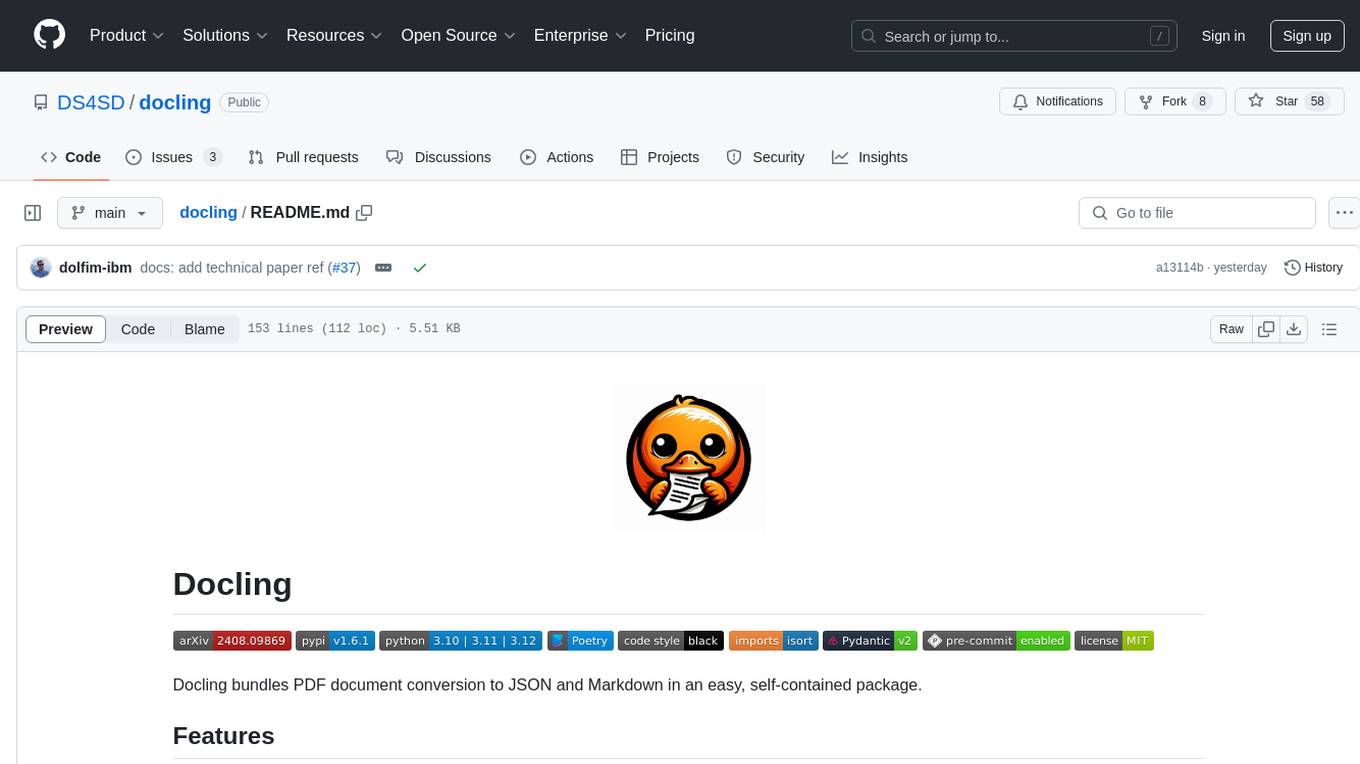
docling
Docling is a tool that bundles PDF document conversion to JSON and Markdown in an easy, self-contained package. It can convert any PDF document to JSON or Markdown format, understand detailed page layout, reading order, recover table structures, extract metadata such as title, authors, references, and language, and optionally apply OCR for scanned PDFs. The tool is designed to be stable, lightning fast, and suitable for macOS and Linux environments.
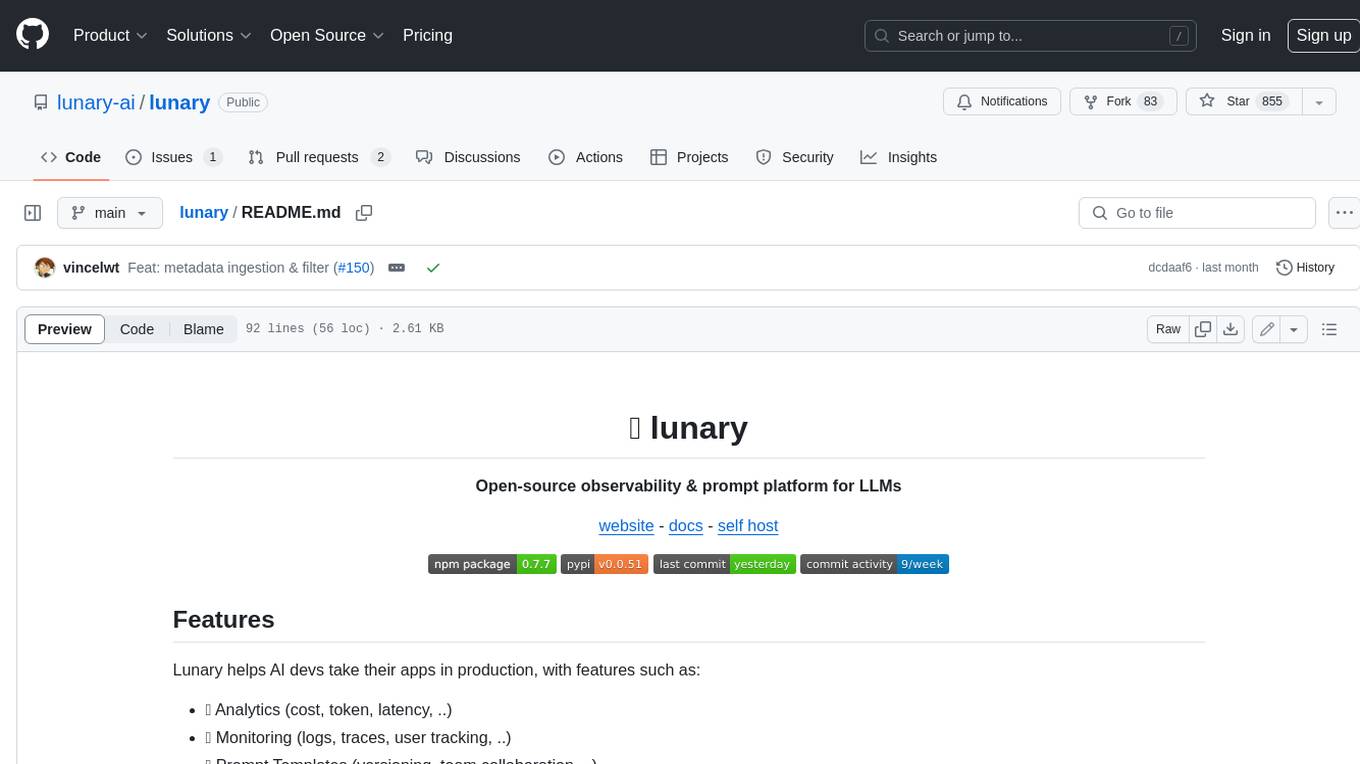
lunary
Lunary is an open-source observability and prompt platform for Large Language Models (LLMs). It provides a suite of features to help AI developers take their applications into production, including analytics, monitoring, prompt templates, fine-tuning dataset creation, chat and feedback tracking, and evaluations. Lunary is designed to be usable with any model, not just OpenAI, and is easy to integrate and self-host.
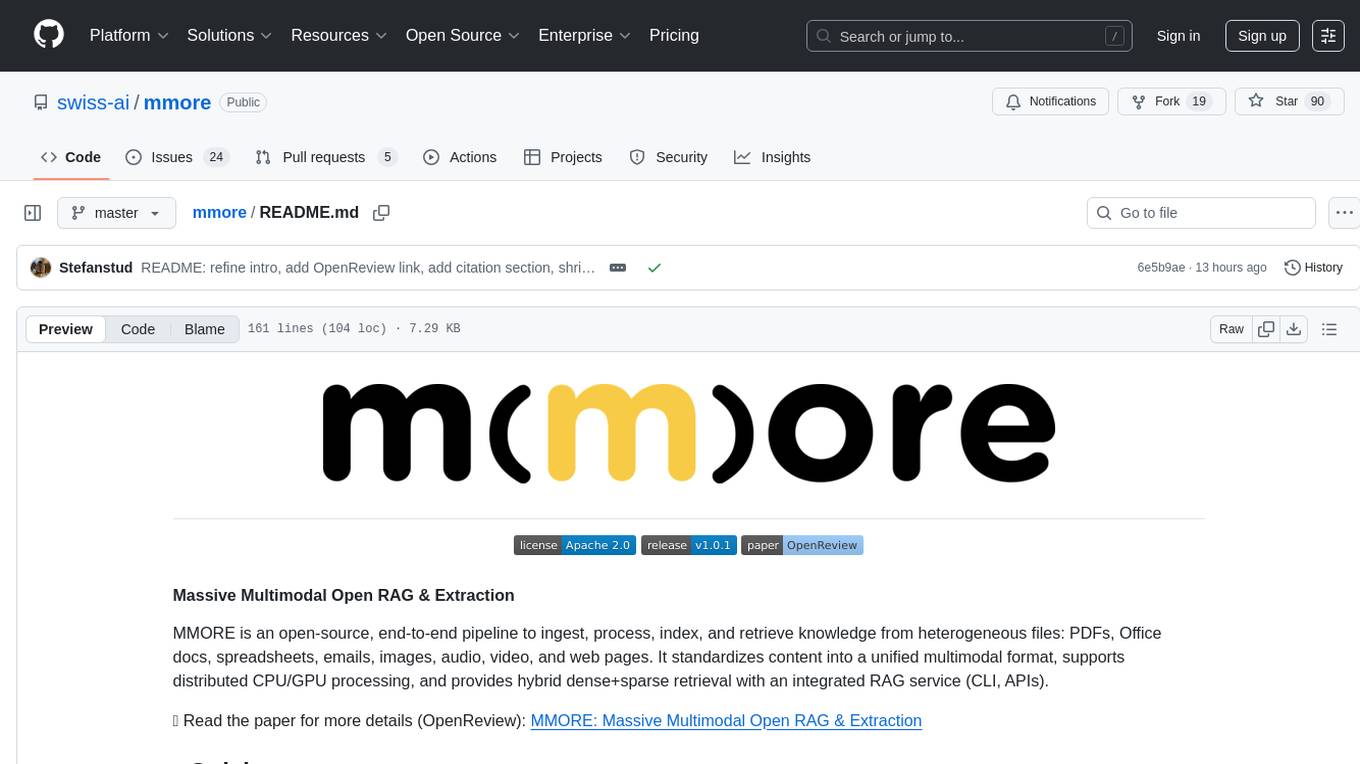
mmore
MMORE is an open-source, end-to-end pipeline for ingesting, processing, indexing, and retrieving knowledge from various file types such as PDFs, Office docs, images, audio, video, and web pages. It standardizes content into a unified multimodal format, supports distributed CPU/GPU processing, and offers hybrid dense+sparse retrieval with an integrated RAG service through CLI and APIs.

agentcloud
AgentCloud is an open-source platform that enables companies to build and deploy private LLM chat apps, empowering teams to securely interact with their data. It comprises three main components: Agent Backend, Webapp, and Vector Proxy. To run this project locally, clone the repository, install Docker, and start the services. The project is licensed under the GNU Affero General Public License, version 3 only. Contributions and feedback are welcome from the community.

starwhale
Starwhale is an MLOps/LLMOps platform that brings efficiency and standardization to machine learning operations. It streamlines the model development lifecycle, enabling teams to optimize workflows around key areas like model building, evaluation, release, and fine-tuning. Starwhale abstracts Model, Runtime, and Dataset as first-class citizens, providing tailored capabilities for common workflow scenarios including Models Evaluation, Live Demo, and LLM Fine-tuning. It is an open-source platform designed for clarity and ease of use, empowering developers to build customized MLOps features tailored to their needs.
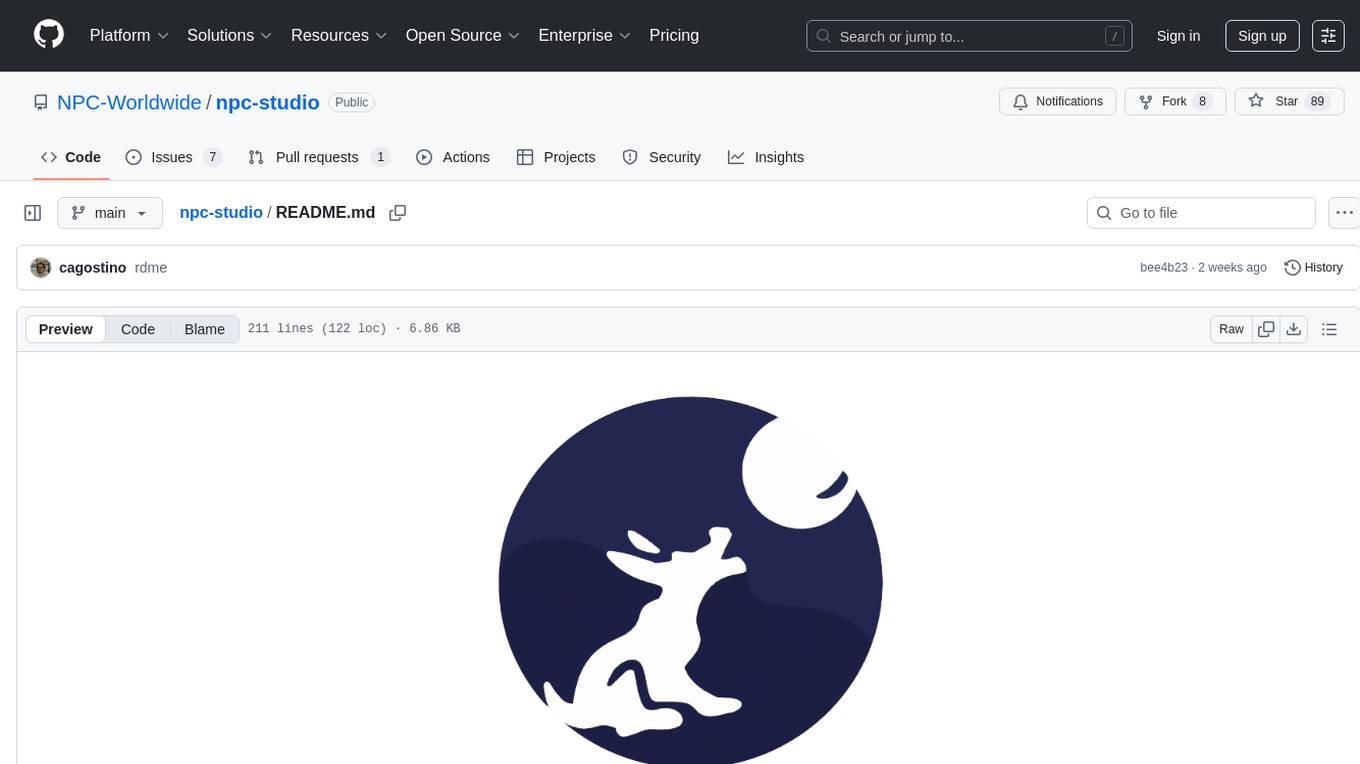
npc-studio
NPC Studio is an AI IDE that allows users to have conversations with LLMs and Agents, edit files, explore data, execute code, and more. It provides a chat interface for organizing conversations, creating and managing AI agents and tools, editing plain text files, analyzing text files with AI, using tiles for conversation, accessing various menus, settings, and a data dashboard. The tool also offers features for photo editing, web browsing with AI, PDF analysis, and development setup instructions for electron-based frontend with a Python Flask backend.
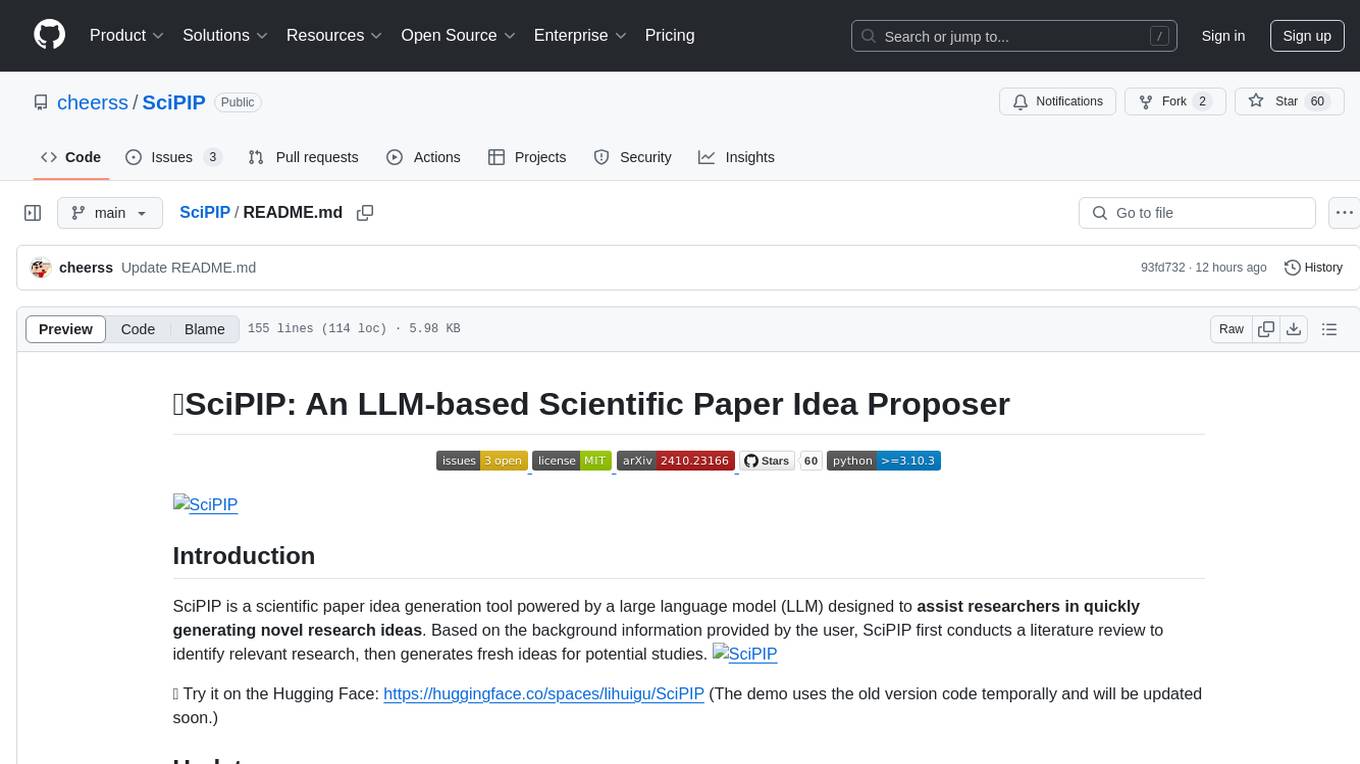
SciPIP
SciPIP is a scientific paper idea generation tool powered by a large language model (LLM) designed to assist researchers in quickly generating novel research ideas. It conducts a literature review based on user-provided background information and generates fresh ideas for potential studies. The tool is designed to help researchers in various fields by providing a GUI environment for idea generation, supporting NLP, multimodal, and CV fields, and allowing users to interact with the tool through a web app or terminal. SciPIP uses Neo4j as its database and provides functionalities for generating new ideas, fetching papers, and constructing the database.
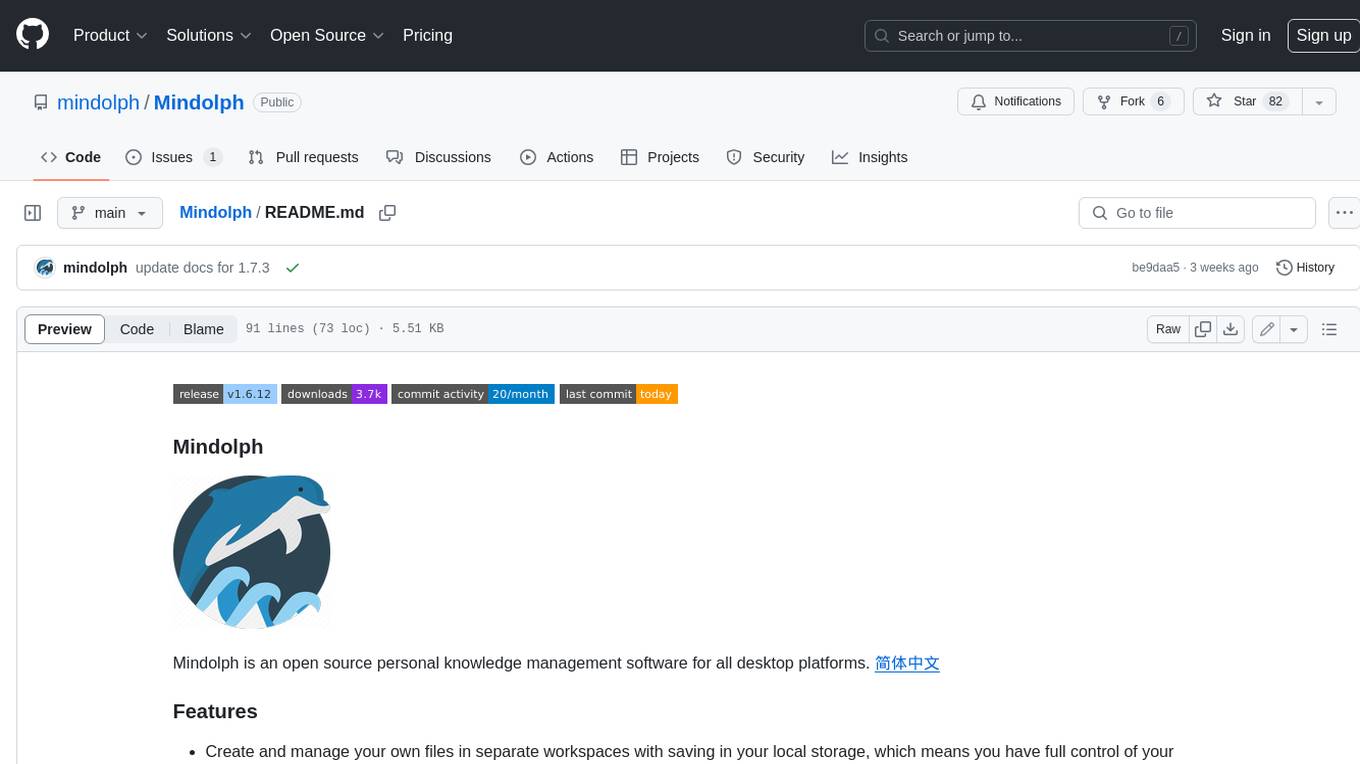
Mindolph
Mindolph is an open source personal knowledge management software for all desktop platforms. It allows users to create and manage their own files in separate workspaces with saving in their local storage, organize their files as a tree in their workspaces, and have multiple tabs for opening files instead of a single file window. Mindolph supports Mind Map, Markdown, PlantUML, CSV sheet, and plain text file formats. It also has features such as quickly navigating to files and searching text in files under a specific folder, editing mind maps easily and quickly with key shortcuts, supporting themes and providing some pre-defined themes, importing from other mind map formats, and exporting to other file formats.
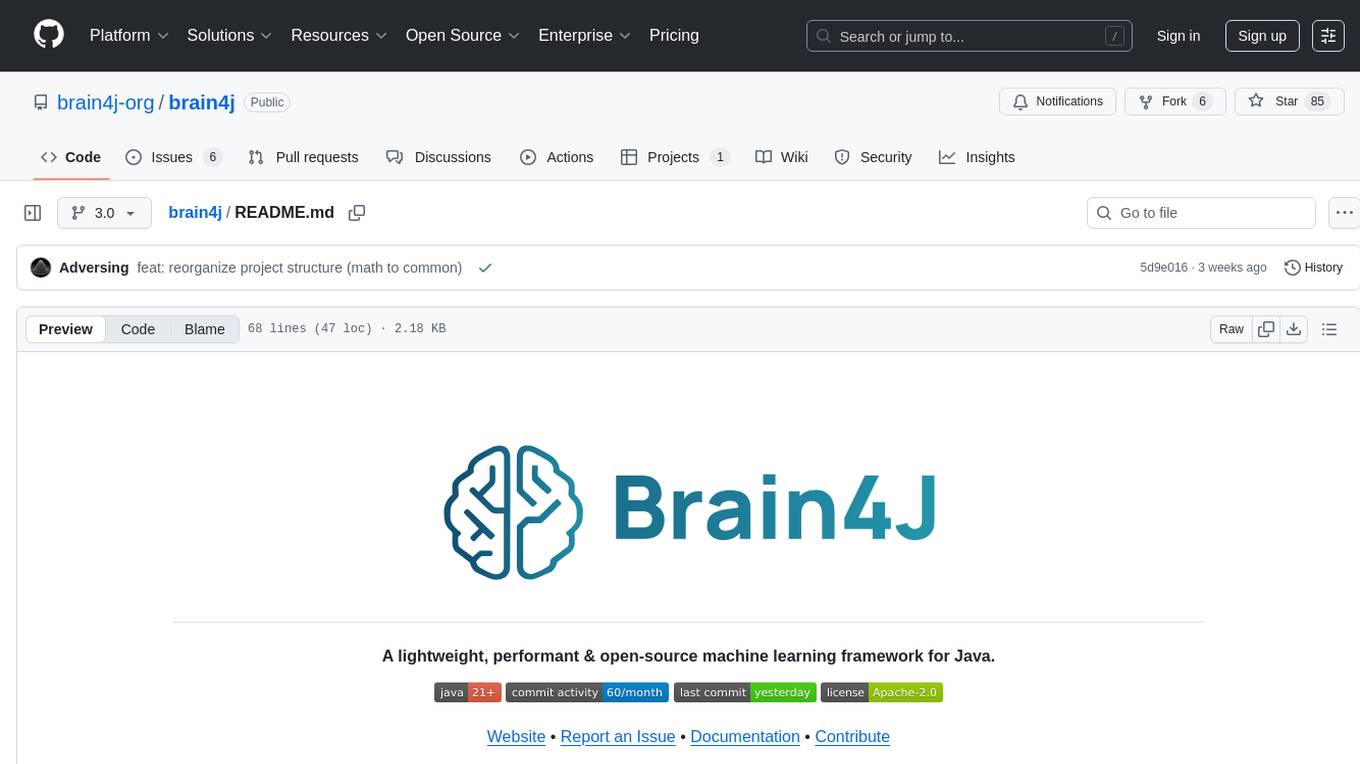
brain4j
Brain4J is a lightweight, performant, and open-source machine learning framework for Java. Designed with portability and speed in mind, it is optimized for high performance and ideal for those looking to implement machine learning solutions in pure Java. The framework provides tools and functionalities to facilitate the development of machine learning models within Java applications, offering ease of use and efficiency.
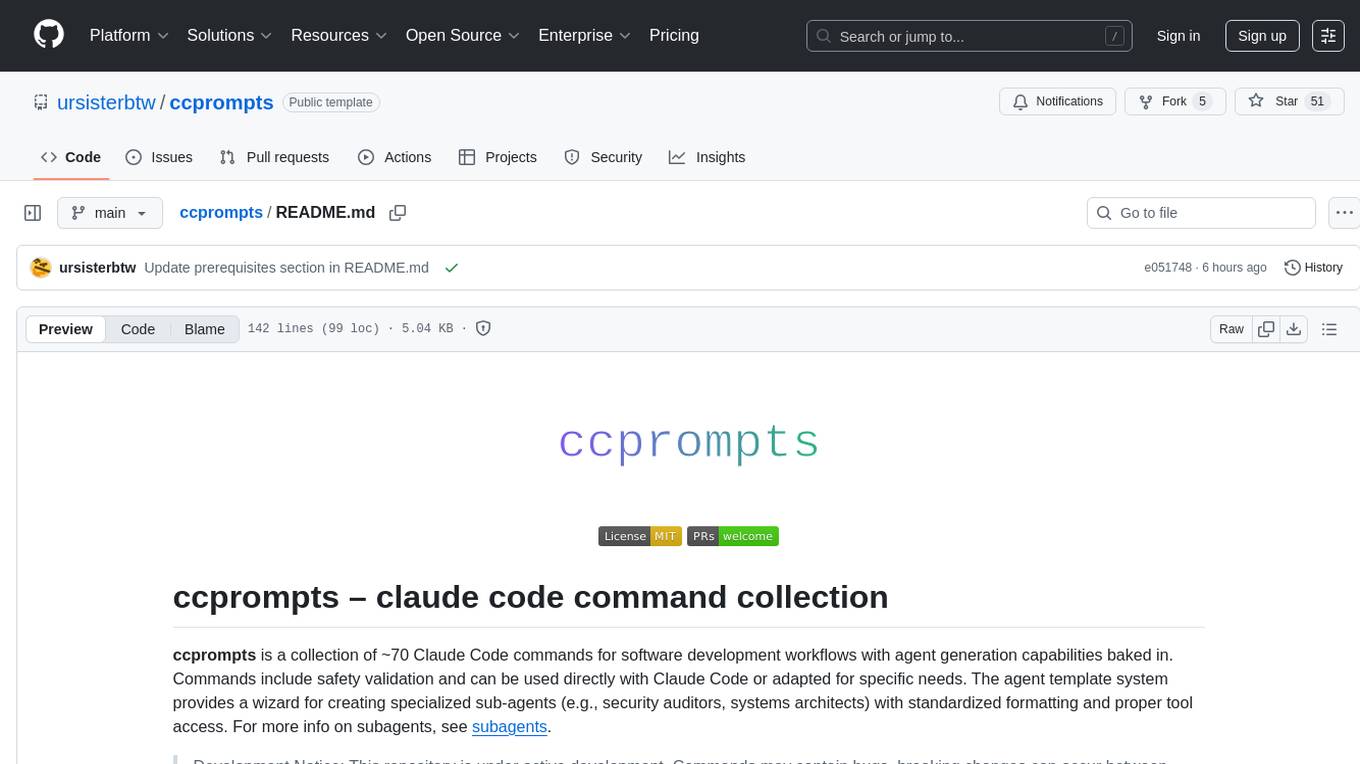
ccprompts
ccprompts is a collection of ~70 Claude Code commands for software development workflows with agent generation capabilities. It includes safety validation and can be used directly with Claude Code or adapted for specific needs. The agent template system provides a wizard for creating specialized sub-agents (e.g., security auditors, systems architects) with standardized formatting and proper tool access. The repository is under active development, so caution is advised when using it in production environments.
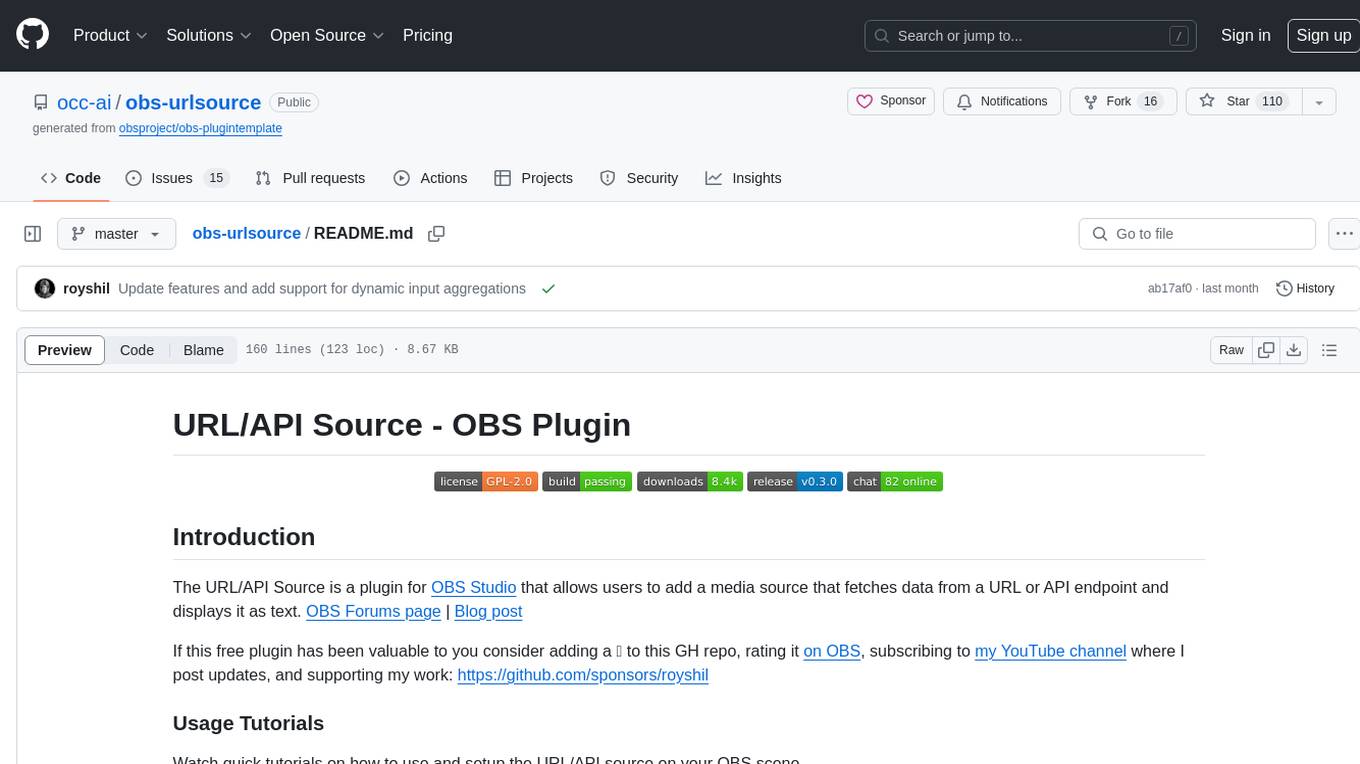
obs-urlsource
The URL/API Source is a plugin for OBS Studio that allows users to add a media source fetching data from a URL or API endpoint and displaying it as text. It supports input and output templating, various request types, output parsing (JSON, XML/HTML, Regex, CSS selectors), live data updating, output styling, and formatting. Future features include authentication, websocket support, more parsing options, request types, and output formats. The plugin is cross-platform compatible and actively maintained by the developer. Users can support the project on GitHub.
For similar tasks

spatz
Spatz is a complete, fullstack template for Svelte that includes features such as Sveltekit for building fast web apps, Pocketbase for User Auth and Database, OpenAI for chatbots, Vercel AI SDK for AI/ML models, TailwindCSS for UI development, DaisyUI for components, and Zod for schema declaration and validation. The template provides a structured project setup with components, stores, routes, and APIs. It also offers theming and styling options with pre-loaded themes from DaisyUI. Contributions are welcomed through feature requests or pull requests.
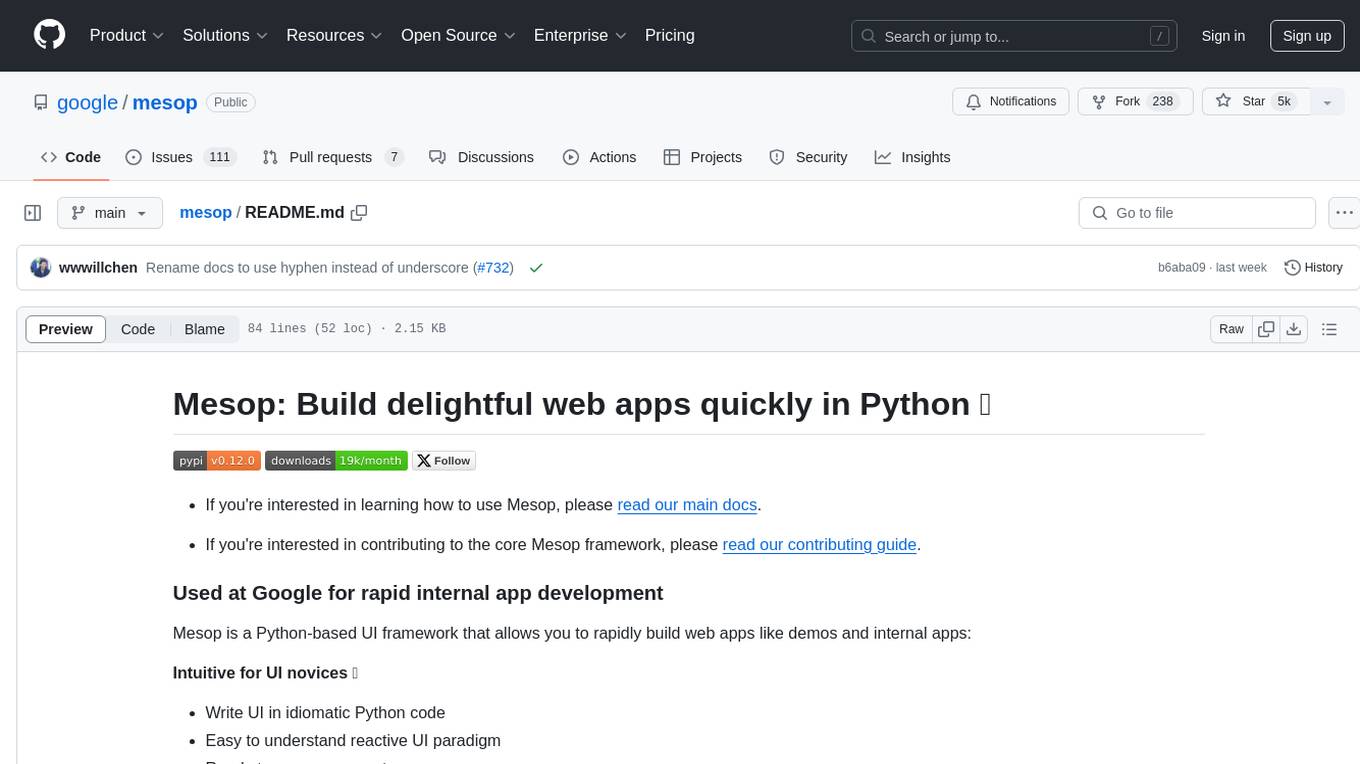
mesop
Mesop is a Python-based UI framework designed for rapid web app development, particularly for demos and internal apps. It offers an intuitive interface for UI novices, frictionless developer workflows with hot reload and IDE support, and flexibility to build custom UIs without the need for JavaScript/CSS/HTML. Mesop allows users to write UI in idiomatic Python code and compose UI into components using Python functions. It is used at Google for internal app development and provides a quick way to build delightful web apps in Python.

spatz-2
Spatz-2 is a complete, fullstack template for Svelte, utilizing technologies such as Sveltekit, Pocketbase, OpenAI, Vercel AI SDK, TailwindCSS, svelte-animations, and Zod. It offers features like user authentication, admin dashboard, dark/light mode themes, AI chatbot, guestbook, and forms with client/server validation. The project structure includes components, stores, routes, APIs, and icons. Spatz-2 aims to provide a futuristic web framework for building fast web apps with advanced functionalities and easy customization.
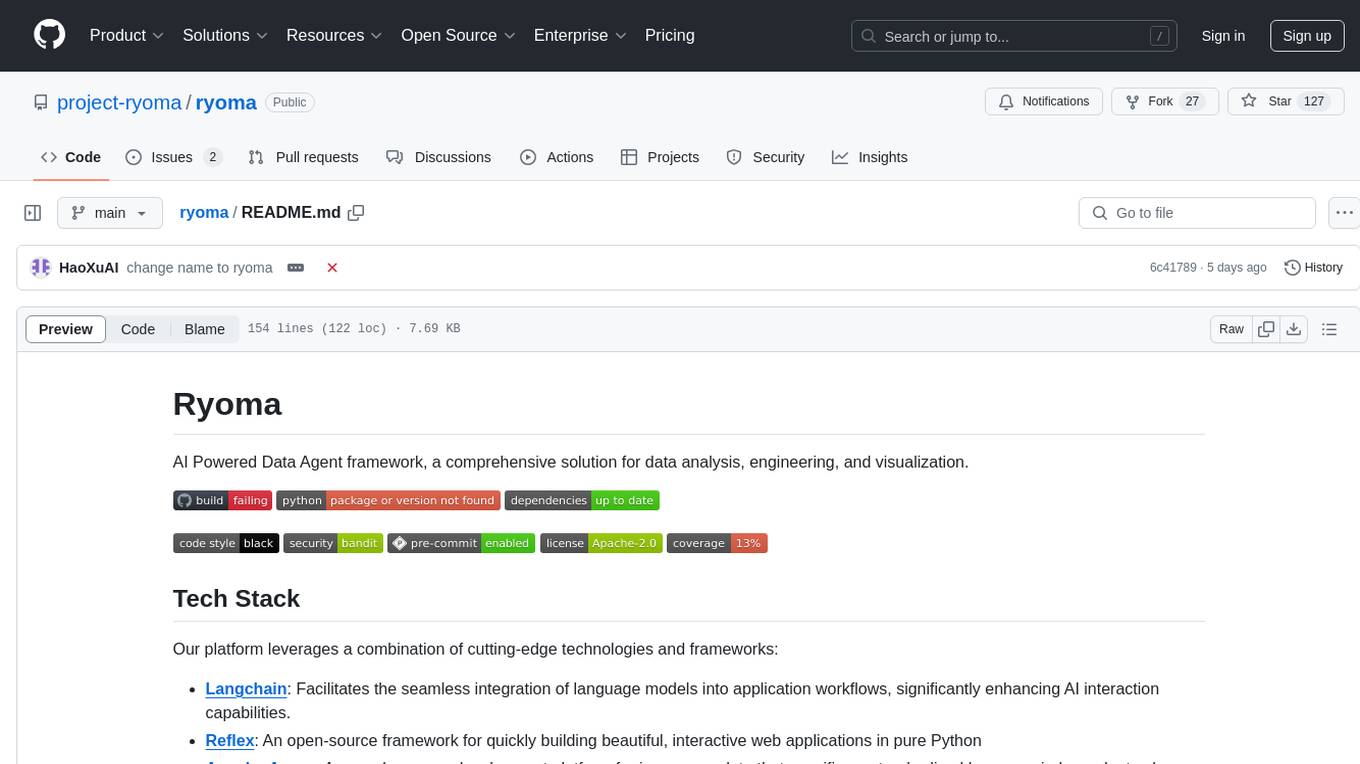
ryoma
Ryoma is an AI Powered Data Agent framework that offers a comprehensive solution for data analysis, engineering, and visualization. It leverages cutting-edge technologies like Langchain, Reflex, Apache Arrow, Jupyter Ai Magics, Amundsen, Ibis, and Feast to provide seamless integration of language models, build interactive web applications, handle in-memory data efficiently, work with AI models, and manage machine learning features in production. Ryoma also supports various data sources like Snowflake, Sqlite, BigQuery, Postgres, MySQL, and different engines like Apache Spark and Apache Flink. The tool enables users to connect to databases, run SQL queries, and interact with data and AI models through a user-friendly UI called Ryoma Lab.
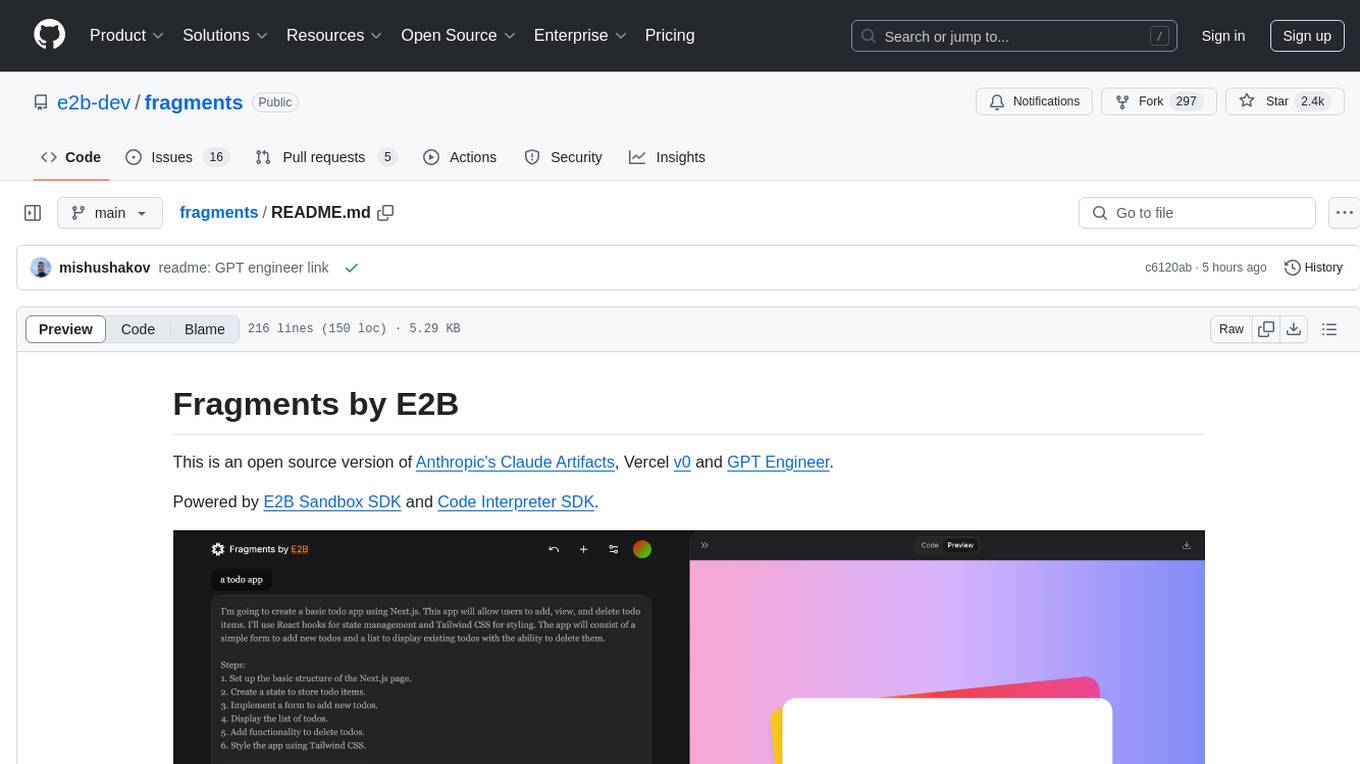
fragments
Fragments is an open-source tool that leverages Anthropic's Claude Artifacts, Vercel v0, and GPT Engineer. It is powered by E2B Sandbox SDK and Code Interpreter SDK, allowing secure execution of AI-generated code. The tool is based on Next.js 14, shadcn/ui, TailwindCSS, and Vercel AI SDK. Users can stream in the UI, install packages from npm and pip, and add custom stacks and LLM providers. Fragments enables users to build web apps with Python interpreter, Next.js, Vue.js, Streamlit, and Gradio, utilizing providers like OpenAI, Anthropic, Google AI, and more.
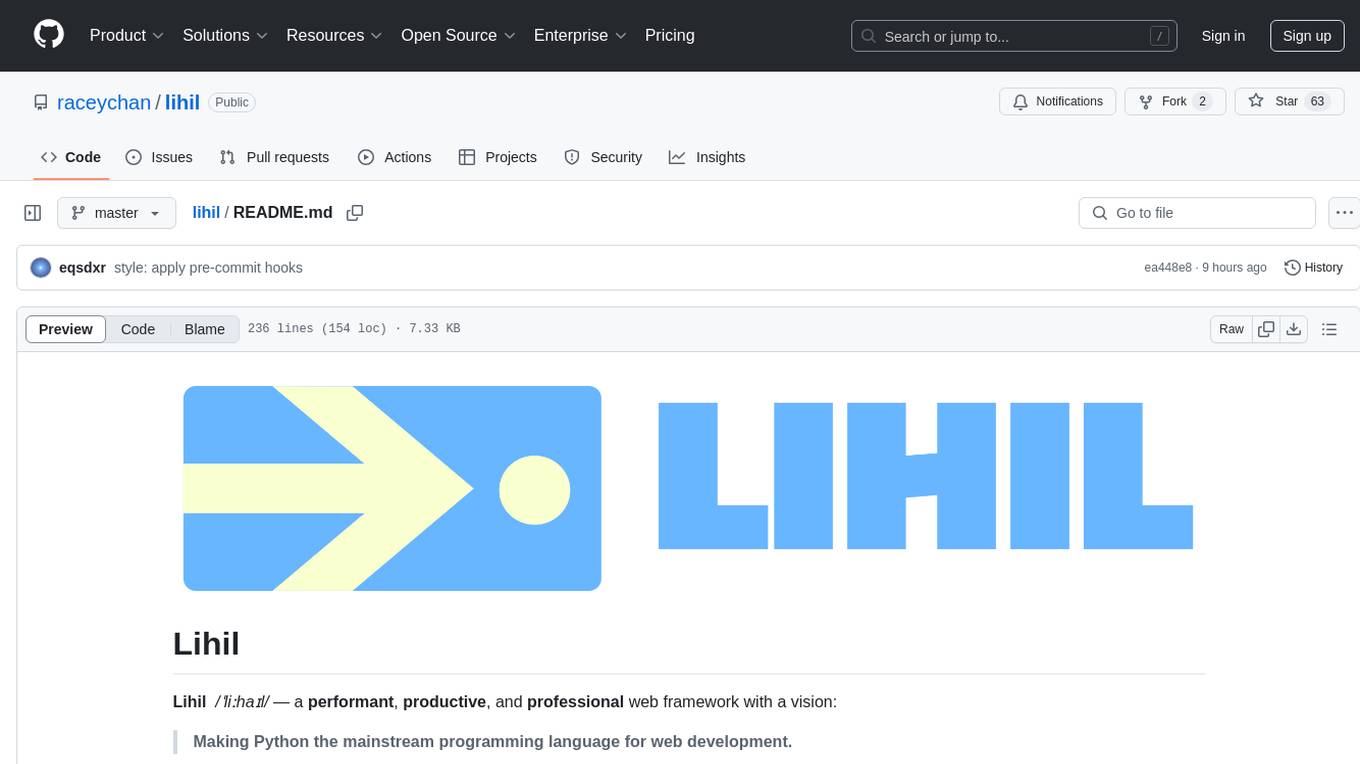
lihil
Lihil is a performant, productive, and professional web framework designed to make Python the mainstream programming language for web development. It is 100% test covered and strictly typed, offering fast performance, ergonomic API, and built-in solutions for common problems. Lihil is suitable for enterprise web development, delivering robust and scalable solutions with best practices in microservice architecture and related patterns. It features dependency injection, OpenAPI docs generation, error response generation, data validation, message system, testability, and strong support for AI features. Lihil is ASGI compatible and uses starlette as its ASGI toolkit, ensuring compatibility with starlette classes and middlewares. The framework follows semantic versioning and has a roadmap for future enhancements and features.
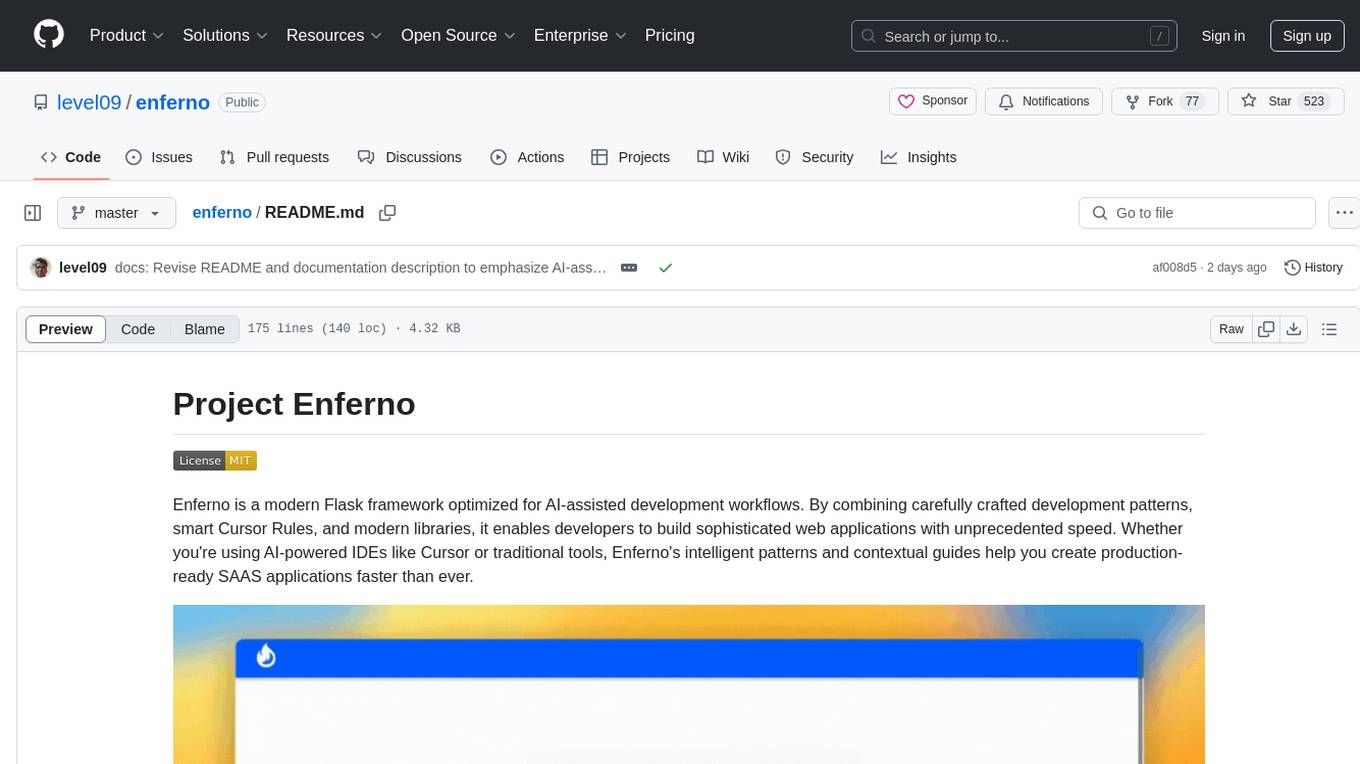
enferno
Enferno is a modern Flask framework optimized for AI-assisted development workflows. It combines carefully crafted development patterns, smart Cursor Rules, and modern libraries to enable developers to build sophisticated web applications with unprecedented speed. Enferno's intelligent patterns and contextual guides help create production-ready SAAS applications faster than ever. It includes features like modern stack, authentication, OAuth integration, database support, task queue, frontend components, security measures, Docker readiness, and more.
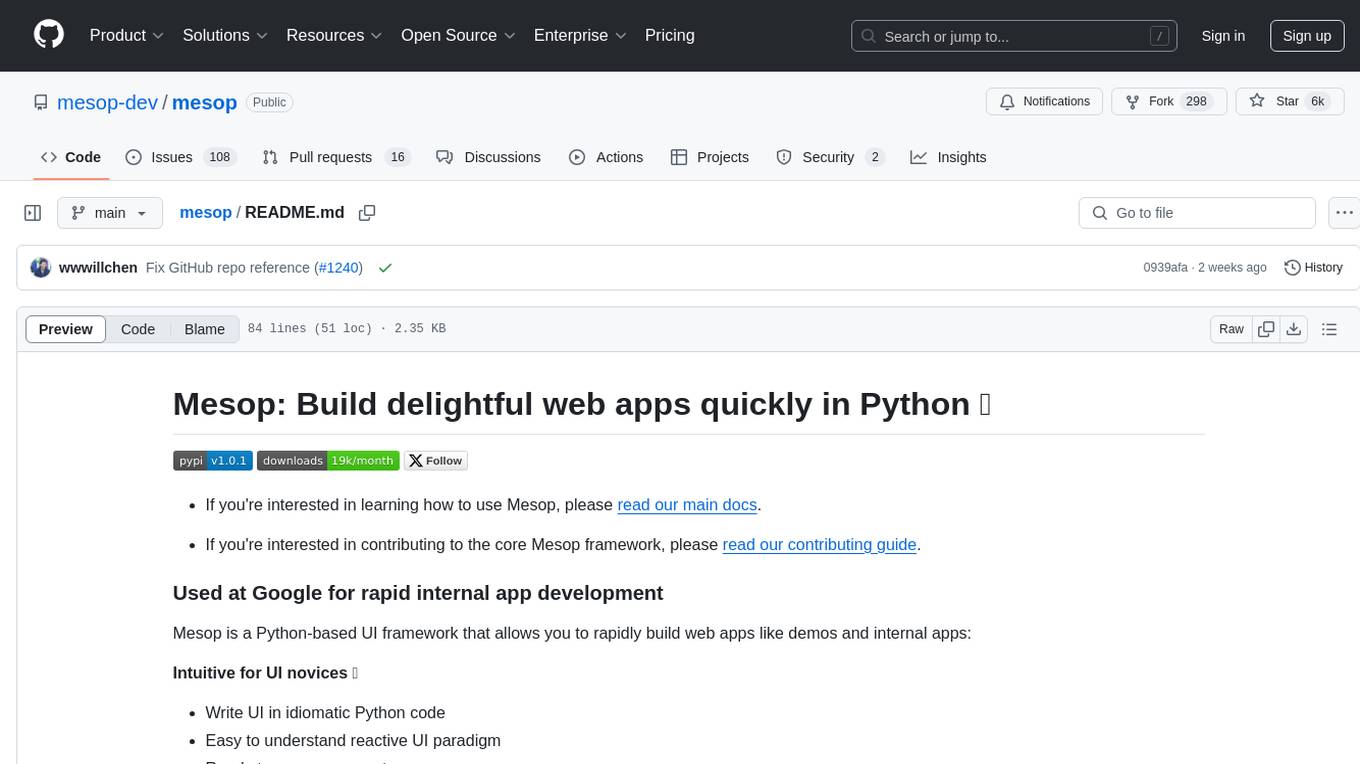
mesop
Mesop is a Python-based UI framework designed for rapid web app development, particularly for demos and internal apps. It allows users to write UI in Python code, offers reactive UI paradigm, ready-to-use components, hot reload feature, rich IDE support, and the ability to build custom UIs without writing Javascript/CSS/HTML. Mesop is intuitive for UI novices, provides frictionless developer workflows, and is flexible for creating delightful demos. It is used at Google for rapid internal app development.
For similar jobs

sweep
Sweep is an AI junior developer that turns bugs and feature requests into code changes. It automatically handles developer experience improvements like adding type hints and improving test coverage.

teams-ai
The Teams AI Library is a software development kit (SDK) that helps developers create bots that can interact with Teams and Microsoft 365 applications. It is built on top of the Bot Framework SDK and simplifies the process of developing bots that interact with Teams' artificial intelligence capabilities. The SDK is available for JavaScript/TypeScript, .NET, and Python.

ai-guide
This guide is dedicated to Large Language Models (LLMs) that you can run on your home computer. It assumes your PC is a lower-end, non-gaming setup.

classifai
Supercharge WordPress Content Workflows and Engagement with Artificial Intelligence. Tap into leading cloud-based services like OpenAI, Microsoft Azure AI, Google Gemini and IBM Watson to augment your WordPress-powered websites. Publish content faster while improving SEO performance and increasing audience engagement. ClassifAI integrates Artificial Intelligence and Machine Learning technologies to lighten your workload and eliminate tedious tasks, giving you more time to create original content that matters.

chatbot-ui
Chatbot UI is an open-source AI chat app that allows users to create and deploy their own AI chatbots. It is easy to use and can be customized to fit any need. Chatbot UI is perfect for businesses, developers, and anyone who wants to create a chatbot.

BricksLLM
BricksLLM is a cloud native AI gateway written in Go. Currently, it provides native support for OpenAI, Anthropic, Azure OpenAI and vLLM. BricksLLM aims to provide enterprise level infrastructure that can power any LLM production use cases. Here are some use cases for BricksLLM: * Set LLM usage limits for users on different pricing tiers * Track LLM usage on a per user and per organization basis * Block or redact requests containing PIIs * Improve LLM reliability with failovers, retries and caching * Distribute API keys with rate limits and cost limits for internal development/production use cases * Distribute API keys with rate limits and cost limits for students

uAgents
uAgents is a Python library developed by Fetch.ai that allows for the creation of autonomous AI agents. These agents can perform various tasks on a schedule or take action on various events. uAgents are easy to create and manage, and they are connected to a fast-growing network of other uAgents. They are also secure, with cryptographically secured messages and wallets.

griptape
Griptape is a modular Python framework for building AI-powered applications that securely connect to your enterprise data and APIs. It offers developers the ability to maintain control and flexibility at every step. Griptape's core components include Structures (Agents, Pipelines, and Workflows), Tasks, Tools, Memory (Conversation Memory, Task Memory, and Meta Memory), Drivers (Prompt and Embedding Drivers, Vector Store Drivers, Image Generation Drivers, Image Query Drivers, SQL Drivers, Web Scraper Drivers, and Conversation Memory Drivers), Engines (Query Engines, Extraction Engines, Summary Engines, Image Generation Engines, and Image Query Engines), and additional components (Rulesets, Loaders, Artifacts, Chunkers, and Tokenizers). Griptape enables developers to create AI-powered applications with ease and efficiency.





